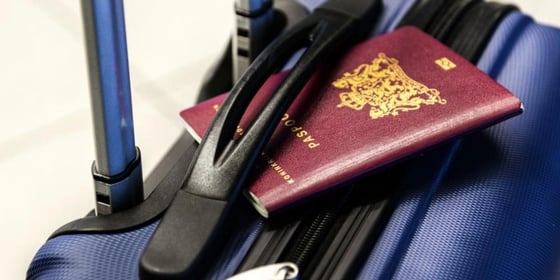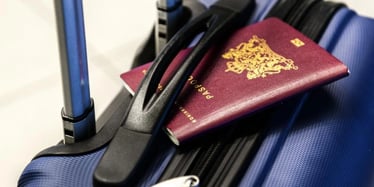📖 - To better understand the differences between the EU Blue Card and a German Work Permit, check out our detailed comparison guide here: Blue Card vs. Work Permit.
Visa for Germany - A Complete Guide for All Visa Types

Contents
A visa is necessary for many individuals moving to Germany to live, work, or study. There are several different types of visa in Germany, and it’s important to apply for the correct one, whether it’s a Student Visa, Language Student Visa, Working Visa or Job Seeker Visa.
This article explains which German visa you need, the required documents, how to apply, processing times, and proof of finance.
Do I need a visa for Germany?
Citizens from the EU, EEA, or Switzerland will not need a visa to travel to Germany, whatever the reason for their visit.
Those from other states may well need to gain a visa in order to work, look for work or study in Germany. Those visiting for less than three months (not to work or study) may need a tourist visa, although Germany has a visa-free agreement with 62 countries. There are numerous types of visas available for those staying in Germany for more than three months including a Student Visa, Job Seeker Visa, and Au Pair Visa.
Those who are not required to have a visa to work or study in Germany must remember that they are required to gain a Residence Permit (Aufenthaltserlaubnis) for stays of more than three months.
How long does a German visa take?
German visas take around 6–12 weeks to be processed from the time of an interview with the German consulate. This means you should start the process of your visa application around 4–5 months before your trip to Germany.
Is a German visa easy to get?
Applying for a German visa has become more straightforward and easier to navigate with the introduction of the Consular Services Portal in January 2025. Here's a simple guide to navigate the new process:
1. Online Application:
-
Access the Portal: Visit the Consular Services Portal to begin your application.
-
Choose Your Visa Type: Utilize the Visa Navigator tool to determine the appropriate visa category for your purpose, such as work, study, or family reunification.
-
Complete the Form: Fill out the application form online, ensuring all information is accurate.
-
Upload Documents: You can submit required documents, such as passport scans, proof of qualifications, and financial statements, directly through the portal.
2. Digital Review:
-
Application Assessment: German authorities will review your submission online.
-
Additional Information: If further details are needed, they will request them via the portal, eliminating the need for multiple embassy visits.
3. In-Person Verification:
-
Schedule an Appointment: Once your application is pre-approved, arrange a visit to your nearest German embassy or consulate for identity verification and biometric data collection (fingerprints and photographs).
🚨 Important Reminder: The new Consular Services Portal has been introduced in around 168 German embassies worldwide. However, not all countries or cities are covered yet. If the portal is not available in your location, you will need to book an appointment to visit the embassy in person to apply for your visa.
To find out if your country is part of the new system for student visa applications, check here.
How much does it cost for German visa?
The German visa fee ranges between €75 to €80 depending on the type of visa you apply for.
German consulate
It’s important to note that even after an interview at a German consulate and having provided all the requested documents, your visa permission is not guaranteed. If everything went well, it is highly likely that your application will be successful, but it is important that you wait for confirmation before being sure and making future plans.
What is the Schengen area?
The 27 countries in the Schengen area are Austria, Belgium, Czech Republic, Croatia, Denmark, Estonia, Finland, France, Germany, Greece, Hungary, Iceland, Italy, Latvia, Liechtenstein, Lithuania, Luxembourg, Malta, Netherlands, Norway, Poland, Portugal, Slovakia, Slovenia, Spain, Sweden, and Switzerland.
What is a Schengen visa?
A Schengen visa is a short-stay visa that allows a person to travel for tourism or business purposes for up to 90 days in any member state of the Schengen area.
Things you need for every type of visa
-
Travel Insurance
Everyone coming to Germany for work or study must register for travel insurance to cover their first few months until they get health insurance in Germany.
-
Funds
You’ll need to prove you have the funds to cover living costs for one year or the duration of your stay.
-
Visa paperwork
You'll need your passport, biometric photo, certificate of enrollment, proof of finances, health insurance, and the filled-out visa application form.
Different Types of Visa
Student Visa
With the exception of EU, EEA, and Swiss citizens, foreign students need to obtain a Student Visa before they begin their studies. To gain this visa, individuals need already to have been accepted onto a course and will also need proof of healthcare insurance and proof of funds, ideally via a deposit in a blocked account (see our Blocked Account page). Those who have not yet had confirmation of acceptance or haven’t decided on a course can apply for a Student Applicant Visa, and then apply for a Student Visa after acceptance.
You can learn more about student visas and how we can help on our German Student Visa page. Please use the page navigation and search menu on our site to find additional information.
Language Student Visa
Foreign (non-EU, EEA, or Swiss) students undertaking a language course that lasts between 3 and 12 months can apply for a Language Student Visa. Again, you will need proof that you enrolled in the course and that you have health insurance. You will also have to show proof of funds in a Blocked Account that covers the duration of your course - these funds should allow you €992 a month to spend.
You can find out more about this visa on our German Visa for Language Students page.
Au-Pair Visa
Those who wish to enter Germany to work as an Au-Pair can apply for a specialist visa. This does not apply to EU, EEA, or Swiss individuals who can work as an Au-Pair without visas.
To apply for an Au-Pair Visa at the German mission, you must be ages between 18 and 26, and you will need to have proof of healthcare insurance (this should be covered by your host family, but you will have to provide evidence of it), a contract with a host family, proof of basic German language skills, and, typically, a motivation letter as well.
You do not need to have proof of finances as the host family largely covers most costs of living, but you will have to prove you have enough money to get there and to pay for the visa.
Job Seeker Visa
Those seeking to move to Germany to work but have not yet found employment can apply for a Job Seeker Visa. Those who have not found employment after six months will need to return home. Those who do find work will then have to apply for a Working Visa.
The requirements for a Job Seeker Visa are quite strict and include having a Bachelor Degree, five years work experience in your field, proof of funds to cover living costs, and either travel or healthcare insurance. Note that EU, EEA, and Swiss citizens do not need to apply for a Job Seeker visa to move to and find work in Germany. You can find out more about this visa on our German Job Seeker Visa page.
Opportunity Card Visa
The Opportunity Card Visa (Chancenkarte) is a new immigration pathway introduced by Germany to attract skilled workers from non-EU countries. It operates on a points-based system, considering factors like qualifications, language skills, professional experience, and connections to Germany. The visa allows qualified individuals to enter the country and search for a job for up to one year. Unlike traditional work visas, applicants do not need a concrete job offer beforehand, making it an ideal option for those looking to explore career opportunities in Germany.
📖 - How is a job seeker visa different from an opportunity card visa? Find out the differences and choose the one that's best for you!
Tourist Visa
Germany has an agreement with 62 countries, (including all EU states, Australia, and the United States) which allows visitors from those states to come to Germany for up to 90 days without a visa. Those arriving from a country not on that list will need a tourist visa for stays of up to 90 days. You will have to apply for a so-called “Schengen visa” if you/your country of residence is not a member of the Schengen area.
Tip: You can most likely apply for the Schengen visa at the German mission in your country.
Working Visa
Those who have already found a job in Germany may need a Long Stay Working Visa. Individuals from the following countries do not need visas in order to enter Germany and work there (but may need to apply for a Residence Permit): EU, EEA, Switzerland, the US, Australia, Canada, Israel, Japan, New Zealand, and the Republic of Korea.
Another option for skilled workers is the EU Blue Card, which is designed for non-EU/EEA nationals who have a university degree and a binding job offer in Germany with a minimum annual salary (currently around €48,300 for shortage occupations). The Blue Card offers numerous benefits, including a faster pathway to permanent residency (typically after 33 months, or 21 months with sufficient German language skills), the ability to bring family members without needing to prove German language skills, and greater mobility to work and live in other EU countries after obtaining permanent residency. The Blue Card is particularly suitable for professionals in fields like engineering, IT, medicine, and mathematics who plan to build a long-term career in Germany.
Business Visa
Those who would like to stay longer than 90 days to conduct business should apply for a Business Visa.
Tip: Are you looking for content on this search term? Then, take a look at the site of the Federal Foreign Office (Auswärtiges Amt). Enter a search term, e.g. “How to stay in Germany on business” and the website/search menu will provide you with relevant information. You can now proceed with the page navigation or select another navigation level.
Guests Scientist Visa
Apply for this visa if you want to take up a role as a Guest Scientist or Researcher.
German Visa Application Process - How To Apply For A Visa
The process for all German visa applications is similar, whether you’re applying as a tourist, a student, or an au-pair. With the introduction of the Consuler Services Portal, student, work, and family reunification visa applications can be made through the new portal. However, for short-term visas such as the Schengen visa, you still need to apply for an appointment at the German Embassy in your city.
If you're unsure which visa you need, you can find out using the Visa Navigator here.
Complete Your Visa Application Online - Learn About the New 2025 Process!

Although some documents differ for each visa, you will ALWAYS need proof of healthcare insurance, a completed form, passport photos, and a current, valid passport.
For more information on the application process for students, see our German Student Visa page.
For more information on the application process for language students, see our German Visa for Language Students page.
For more information on the application process for a Job Seeker Visa see our German Job Seeker Visa page.
German Visa Requirements
Some requirements during the visa application are specific to certain visas however many requirements apply to all applications. This is likely to include the following:
German Visa Document Checklist
-
Completed Visa Application Form
If you’re applying online via the Consular Services Portal, you’ll find this form online during the application process. If you have an in-person appointment at the embassy, you can download the form, fill it out, and bring it with you. -
Valid Passport
Your passport must be less than 10 years old and valid for at least 3 months after your planned departure from Germany. -
Copy of Your Passport’s Biometric Page
Usually found at the beginning of your passport, this page contains your personal information and photo. -
Biometric Passport Photos
These should meet official standards (e.g., neutral expression, light background, correct size) and be taken recently. -
Proof of University Admission or Employment (depending on your visa type)
A formal admission letter from your German university, employer, or the applicable authority in your case. -
Proof of Financial Resources (Finanzierungsnachweis) (this can also differ based on your visa type)
This can include:-
Blocked account confirmation showing the required amount per year (currently €11,904 for 2025).
If you are not using a blocked account, you may instead provide:
-
Scholarship confirmation
-
Declaration of commitment (Verpflichtungserklärung) from a sponsor in Germany
-
Proof of parental income or savings
- Salary slips
-
-
Travel Health Insurance
Coverage for at least your first 3 months in Germany is required. The coverage can differ based on your type of visa. After arriving, you’ll need to register with a German health insurance provider. -
Academic Records and Certificates (if you are a student or working professional)
Include transcripts, diplomas, and any other relevant academic documents. -
Language Proficiency Proof (if you are a student or working professional)
Depending on your course language:-
German language certificate (e.g., TestDaF, DSH)
-
English language certificate (e.g., IELTS, TOEFL)
-
-
Curriculum Vitae (CV)
Make sure it’s up-to-date with your academic and professional background. -
Motivation Letter
Explain your reasons for coming to Germany. -
Proof of Previous Study or Employment (if applicable)
You may need to show your academic or professional history. -
Copies of All Documents
Bring both the originals and photocopies of each required document. -
Visa Appointment Confirmation
A printout of your appointment confirmation, if applicable.
💡 - Stay on top of your student visa application with our complete visa checklist, download it here!
Remember
This is a general checklist that covers the common requirements for a German visa. Additional documents such as academic records or proof of employment may be required depending on the type of visa you are applying for. Always check the official website of the German consulate in your country for the most accurate and up-to-date list of required documents, as they can vary based on your location and visa type.
How can I get a tourist visa for Germany?
Individuals from 62 counties, including EU & EEA countries, Switzerland, the US, and Australia, do not need a Tourist Visa for travelling to Germany for a period of up to three months. Those who do need a Tourist Visa for Germany should obtain one via the German consulate in their home country. Tourist Visas do not have the same requirements as the other main visas, but are as follows:
- Proof of accommodation (e.g. hotel booking)
- Travel insurance
- Passport
- Bank statement
- Flight reservation
- Passport photos
- Completed application form
Proof of Finances
Read on to find out why you need to prove your finances for a German visa and ways you can do so.
Those applying for certain German visas, including Student or Job Seeker Visas, will have to prove they have sufficient funds to cover the cost of living during their stay in Germany. A sufficient level of financial resources can be proved in a number of ways, including a blocked account, which is considered the most convenient option and the most successful in terms of visa approval.
How can I prove my financial resources to study in Germany?
There are various ways to prove financial resources if you intend on studying in Germany. The best option is to open a Blocked Account (see below).
Who needs to provide proof of financial resources?
Proof of financial resources (Finanzierungsnachweis) is necessary for those applying for long-stay German visas, including a Student Visa, Language Course Visa, Student Applicant Visa, and a Job Seeker Visa, as well as those applying for residence permits. EU/EEA/Swiss citizens, however, who can live and work in Germany without a visa or permit, do not need to provide proof of financial resources during the visa application.
That doesn’t mean that it’s a good idea to move to Germany without sufficient money to cover a few months living costs, of course.
How to prove my financial resources?
There are a few ways that you can prove your financial resources, including a blocked account, proof of a scholarship, proof of parental income, or a bank guarantee.
A Blocked Account is generally the easiest and most straightforward option which is also preferred by the German authorities when approving your visa, but you may be able to use one of these other options instead.
What counts as proof of financial means?
The proof will generally need to come in the form of a letter, bank statement, or blocked account fund confirmation. You may well need both a soft and hard copy of this evidence.
Proof of scholarship
If some (or all) of your funding is coming from a scholarship, then proof of this scholarship will need to be presented during your visa interview. If the scholarship is only partially covering your living costs, then you will still need to set up a blocked account to prove you have the remainder of the necessary funds to cover your entire first semester.
Proof of sponsorship
Students being sponsored by a host in Germany, or someone that isn’t their parents (e.g. their spouse), will need a sponsorship letter as proof of financial resources. The sponsor may also need to provide bank statements.
Parental income
For those whose parents are paying their cost of living during their time studying in Germany, a letter from the parents, three months of bank statements, and possibly even a copy of their employment contract will be the necessary proof.
Although proof of parental income via a letter and a statement/contract will often suffice, many students still choose to set up a blocked account, to which parents can transfer the funds ahead of the visa interview.
Bank guarantee
Some students and job seekers choose to take out a bank loan in their home counties to cover their living costs once in Germany. If this is how you intend to fund your studies, you will need proof from your bank in the form of a guarantee that the bank is providing you with a loan big enough to cover these costs.
Prove your finances with Expatrio!
-
Fast
Our superior Customer Service will handle your request within 24h!
-
Low fees
Enjoy low fees and peace of mind with transparent prices!
-
Visa paperwork
Accepted by German authorities worldwide and secured by European regulation!
German Blocked Account
Here at Expatrio we offer a German Blocked Account service for those applying for a range of German Visas.
What is a Blocked Account?
A Blocked Account, or Sperrkonto, is a special type of German bank account available to foreign individuals. It can be set up online from your home country, and the money is ‘blocked’ until you arrive in Germany. Once settled in Germany, you will start to receive monthly payouts from your Blocked Account into your regular everyday Bank Account so you can use this money for your life in Germany. A Blocked Account can be used to withdraw a maximum of €992 a month (this amount is decided by the German Government). This helps students stick to their monthly budget.
We at Expatrio offer our very own Blocked Account service. We partner with Aion Bank and Mangopay, who provide the financial technology for the accounts. Expatrio Blocked Accounts are accepted by German authorities worldwide.
Those applying for Student Visas will need to prove they have enough funds in their Blocked Account to cover one year. The average living costs for students in Germany are calculated at €992 per month, which means you will need to have €11,904 in the account. Those applying for Student Language Course Visas will need to have enough to cover the duration of a course.
As of January 2024 the standard monthly blocked amount for university students is €992 per month. Please note: the authorities might ask you for a different amount based on the details of your visa application.
Our registration process is quick and easy; you can apply for your account online and receive confirmation of it the next day. A blocked account via Expatrio costs just €69 to set up and then €5 per month.
Those applying for an Au-Pair Visa do not need to have proof of funds as high as this and so do not need a blocked account. Au-Pair Visa applicants may still need to prove they have enough money to travel to Germany, however.
You can find out more about the benefits of this type of account on our blocked account information page, and you can begin the registration of your account today quickly and easily on our Blocked Account service page.
Expatrio Blocked Account
Want a fast, easy, and secure Blocked Account? Open yours online while still in your home country.
Proof of Health Insurance
The German healthcare system requires all residents to register for Health Insurance by law.
The vast majority (around 90%) are enrolled in the Public healthcare system. However some individuals are eligible to choose Private Health insurance, including students aged over 30, students on language (preparatory) courses, freelancers, and those earning above €60,750.
Every type of German visa requires proof of healthcare cover. This includes a Student Visa, a Language Course Student Visa, and even a Tourist Visa. For the other shorter-stay visas, travel insurance with healthcare cover may suffice.
Tip: If you are looking for content on health insurance, please enter a term like “health insurance” on our Blog and browse the navigation page to find service articles about how to stay in Germany on our website.
Is Health Insurance mandatory for Germany?
Yes, either Private or Public (statutory) Health Insurance is mandatory in Germany for all citizens. Most residents pay for healthcare through social security contributions as part of their salary.
All employees are automatically enrolled in the public healthcare system, although everyone has some choice about which provider or Krankenkasse they choose.
Which Health Insurance is best in Germany?
When choosing Health Insurance in Germany, many people start with one of the major statutory Health Insurance providers, and Techniker Krankenkasse (TK) is often a top choice. TK is especially popular among internationals because of its English-language support, reliable customer service, and comprehensive public coverage.
However, Public Health Insurance isn’t always the most suitable option for everyone.
Why consider Private Health Insurance?
For certain groups like high earners, freelancers, or international students over 30, Private Health Insurance ) can be more affordable, offer more benefits, and give access to faster, more personalized medical care.
One standout option for this group is our partner ottonova.
Why ottonova?
-
More affordable for students aged 30+, who can save up to €1,425 with ottonova compared to other Public Insurance providers, depending on their circumstances.
-
Offers 100% digital services in English - from signup to scheduling doctor appointments.
-
Access to private doctors, shorter waiting times, and tailored plans.
-
Customer support and medical concierge available via the app, 365 days a year
-
Transparent pricing, with a focus on international customers.
In many cases, especially for older students or young professionals, ottonova can be more cost-effective than Public while providing more comprehensive benefits.
Tip: Choosing between public and private insurance in Germany depends on your age, employment status, income, and health needs.
Do I need Travel Insurance for Germany?
Those visiting Germany for a short stay of less than three months will need adequate travel insurance in order for the German consulate to issue a tourist visa. Those visiting for less than three months from the EU, EEA, or Switzerland do not need a visa and can use an EHIC card for healthcare cover.
Get your Health Insurance
With our Health Insurance Plus you will benefit not only from excellent healthcare coverage, but also from additional benefits specially chosen for you.
This might also be of interest to you

How to Move to Germany as an American in 2025
Germany is one of the most popular destinations for Americans looking to relocate to Europe. Whether you’re moving for work, education, or simply for...

German Months
Fundamental to learning any language is becoming familiar with how to talk about days, weeks, months, and years. Mastering how to communicate about...

German Culture
Germany is home to over 80 million people – as well as a diverse array of religions, customs, and traditions that make up the rich national psyche....

Costs of Living in Germany
Anyone planning on moving to or studying in Germany needs to know exactly how much it is going to cost to live there. Part of planning this exciting...

15 Best Places To Visit In Germany [Guide]
Germany is a fascinating country with an abundance of attractions that draw tourists from all over the world. From the vibrant city life of Berlin to...

Visa for Germany - A Complete Guide for All Visa Types
A visa is necessary for many individuals moving to Germany to live, work, or study. There are several different types of visa in Germany, and it’s...

Tourism in Germany
Germany Tourism: Why Germany is one of the top tourist attractions in the world Visiting Germany's most famous cities is a top priority for many. But...

Insurances in Germany
“Germans have insurance for everything” - that might sound superficial but it is true. German insurance system offers a wide choice of ways to ensure...




